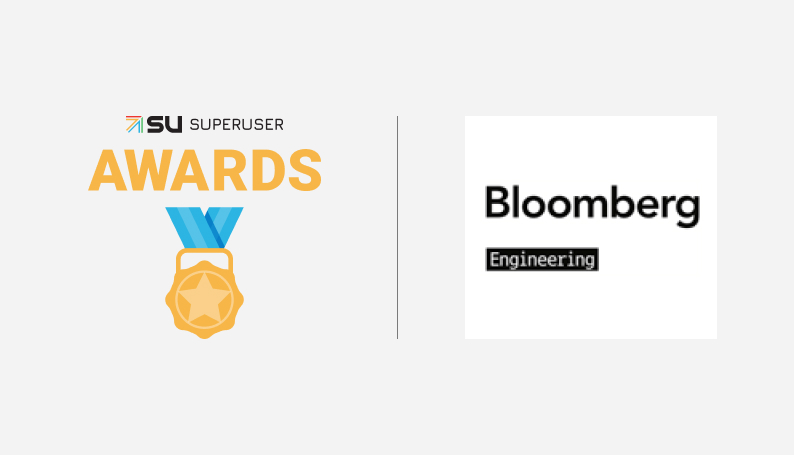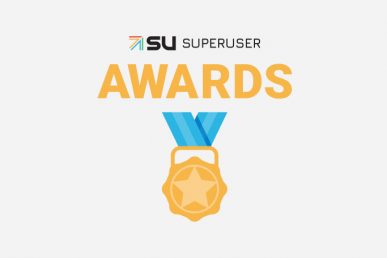Who do you think should win the 2022 Superuser Awards? The annual Superuser Awards are to recognize organizations that have used open infrastructure to improve their business while contributing back to the community.
This year, the Superuser Awards winner will be announced at the OpenInfra Summit Vancouver, June 13-15! Join us at the annual OpenInfra Summit for an opportunity to collaborate directly with the international community of people building and running open source infrastructure using Linux, StarlingX, OpenStack, Kubernetes, Kata Containers and 30+ other technologies. Get your Summit tickets now!
Bloomberg is one of the 10 nominees for the Superuser Awards 2023. Check out why its team is getting nominated:
Who is the nominee?
Bloomberg
Compute Engineering: Tyler Stachecki, Jing Geng, Chris Morgan, Dmitry Margolin, Will Stevens and Lei Zhang
CTO Compute Architecture: Andrey Rybka
Bloomberg Open Source Program Office: Alyssa Wright and Michael Moss
How has open infrastructure transformed the organization’s business?
As an open source first company, Bloomberg has made great strides in adopting and contributing back to open source software over the past two decades. Open infrastructure has been a key driver throughout this process, playing a pivotal role in enabling our business to rapidly stand up on-premise cloud infrastructure across the globe to accommodate our growth. Open source cloud technology also enables us to improve the power efficiency of our data centers and helps reduce our carbon footprint.
How has the organization participated in or contributed to an open source project?
In addition to financial support for the OpenInfra Foundation & Ceph Foundation, our engineers contribute patches upstream to OpenInfra projects, Project Calico, the Linux kernel, etc. Bloomberg is heavily involved in the OpenInfra community & user base. Chris Morgan leads the OpenStack Ops Meetup team; our engineers attend OpenInfra events. Bloomberg has played a role in advancing multiple open source technologies. In the Python community, one of our employees is a member of the Python Steering Council, multiple Python core devs work at Bloomberg plus we published net-new open source tools: Memray & PyStack. Bloomberg was the first recipient of the CNCF End User Award(2018), recognizing its significant contributions to the cloud native ecosystem, specifically to Kubernetes/Prometheus.
What open source technologies does the organization use in its open infrastructure environment?
Bloomberg uses a myriad of open source tech in our infrastructure environment including, but not limited to: Ansible, Calico, Ceph, Kubernetes, OpenStack, Salt and Terraform. A list of some open source technologies used at Bloomberg can be found here: https://www.bloomberg.com/company/values/tech-at-bloomberg/open-source/projects/
In 2023, Bloomberg launched a Free and Open Source Software (FOSS) Contributor Fund (https://www.bloomberg.com/company/stories/bloomberg-ospo-launches-foss-contributor-fund/), an open source funding initiative of which Apache Arrow, Curl and Celery were chosen by Bloomberg employees and open source contributors as the inaugural recipients of the grants.
What is the scale of your open infrastructure environment?
Bloomberg’s global compute and storage investment consists of over 400K OpenStack cores, several petabytes of RAM, and hundreds of petabytes of replicated Ceph block and object storage. We also run hundreds of bare-metal and virtual Kubernetes clusters. More recently, we have also enacted plans to expand our open infrastructure footprint into the networking arena with SONiC, which we hope to leverage to manage our multi-terabit class network fabric.
What kind of operational challenges have you overcome during your experience with open infrastructure?
Bloomberg overcame many interesting operational hurdles in the past year, e.g., as part of a newly renovated object storage platform, we IDed and helped resolve a multi-site RGW synchronization bug in Ceph (BUG #57562) that arose at high levels of concurrency. While upgrading the OS and firmware across our fleet of thousands of infrastructure servers with zero downtime, we IDed and worked with the community to resolve a tricky live-migration issue upstream (BUG 1982284) that prevented our rolling hypervisor deployments from being transparent to our customers. Jing Geng will celebrate our triumph over these challenges in her OpenInfra Summit 2023 presentation: “The Tortoise Beats the Hare: Upgrading the Operating System of the Cloud at Scale.”
How is this team innovating with open infrastructure?
We have expanded our private cloud infrastructure and BGP-based IP networking fabric globally. These technologies are now in use by more than 8,000 developers on multiple continents. We also started evaluating different tiers of file and block storage to fill high-performance infrastructure needs. Thanks to OpenStack’s vendor-neutral design, we can rapidly incorporate these emerging technologies into our infrastructure with ease.
The Superuser Editorial Advisory Board will review the nominees and determine the finalists and overall winner after the community has had a chance to review the nominees and vote.
- Meet OpenInfra Europe Advisory Board Member: Kurt Garloff - December 21, 2023
- NVIDIA’s Journey with Kata Containers and Confidential Computing | OpenInfra Live Recap - December 18, 2023
- Large Scale Ops Deep Dive: Samsung SDS | OpenInfra Live Recap - December 14, 2023

)










